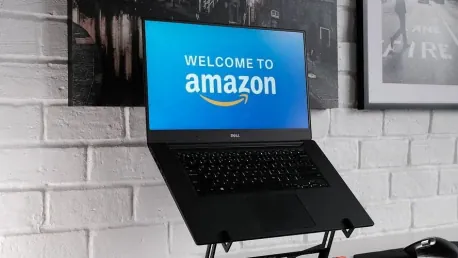Amazon has taken a significant step forward in revolutionizing the e-commerce landscape with the initiation of its Prime Air drone delivery service trials in the UK. This groundbreaking development is part of a broader initiative by the UK’s Civil Aviation Authority (CAA), which includes six distinct projects exploring the practical applications of drones for deliveries. Under current rules, British drone operators are required to keep their machines within sight. However, the selected projects for these trials will utilize advanced navigation, control technologies, and air traffic detection capabilities, allowing for flights beyond visual lines of sight. This marks a considerable advancement and offers a glimpse into the potential future of drone-based logistics.
Amazon’s Technological Advancements
Leveraging Advanced Navigation and Control Technologies
The trials for Amazon’s Prime Air drone delivery service are set to break new ground in the field of e-commerce by leveraging advanced technological capabilities. Utilizing cutting-edge navigation systems and control technologies, these drones will be able to operate beyond visual line of sight (BVLOS), a crucial development for the industry. The significance of such technology cannot be overstated as it represents a leap from traditional drone operations, which are restricted by visual line-of-sight requirements. This shift enabled by sophisticated navigation and control mechanisms will open up new avenues for efficient and timely deliveries.
In addition to the navigation perks, these trials will also explore the use of air traffic detection technologies to ensure the safe operation of drones in occupied airspace. By integrating air traffic management systems, drones will be capable of autonomous flying while avoiding collisions and adhering to flight regulations. This is particularly pertinent in densely populated areas where the risk of airspace congestion is higher. The successful implementation of these systems will not only assist Amazon but also set a precedent for the broader drone delivery industry, facilitating smoother integration of drones in urban settings.
The Significance for E-commerce
The participation of Amazon in these innovative trials signifies a pivotal shift towards efficiently integrating drones into routine e-commerce operations. According to Sophie O’Sullivan, the CAA director, the trials are seen as a crucial step in making BVLOS operations a standard practice in UK airspace. This move is critical for the e-commerce sector, where timely and reliable deliveries can significantly impact customer satisfaction and loyalty. For Amazon, a company that continuously seeks to enhance its delivery services, the ability to operate drones beyond visual lines of sight offers an unprecedented opportunity for streamlining logistics.
In addition to enhancing delivery speed, drone technology can also reduce the company’s reliance on traditional transportation methods, providing a more sustainable and environmentally friendly solution. Considering the growing consumer demand for rapid delivery and eco-conscious practices, Amazon’s investment in drone delivery technology positions the company to meet these evolving consumer expectations. The current trials also highlight Amazon’s broader strategy of adopting innovative technologies to stay ahead in the competitive e-commerce landscape. As Amazon continues to refine its drone operations, the potential for wider adoption across the industry becomes increasingly plausible.
Amazon’s Broader Strategic Vision
Alignment with Robotic Fulfillment Centers
Beyond its pioneering drone delivery trials, Amazon has also made significant strides in automation with the recent opening of a £500 million robotic fulfillment center in Leeds. This strategic move underscores Amazon’s commitment to blending drone technology with advanced robotics, setting the stage for a new era in logistics and fulfillment. The Leeds facility represents more than just a financial investment; it is a symbol of Amazon’s broader vision to streamline and automate its supply chain operations. Equipped with state-of-the-art robotic systems, this facility aims to enhance operational efficiency and reduce human error, which is often associated with manual processes.
The integration of robotic fulfillment centers with drone delivery systems presents a holistic approach to logistics that could revolutionize the industry. By utilizing robots for warehousing and inventory management, coupled with drones for last-mile delivery, Amazon aims to minimize delays and optimize the entire supply chain. This symbiotic relationship between ground and aerial automation stands to significantly reduce operational costs and improve service reliability. Moreover, the convergence of these technologies will enable Amazon to cater to a larger customer base with unprecedented speed and accuracy.
Industry Implications and Future Prospects
The confluence of Amazon’s drone delivery and robotic fulfillment center initiatives encapsulates the company’s relentless pursuit of operational efficiency and innovation. This dual approach not only enhances Amazon’s logistics capabilities but also sets a benchmark for the broader e-commerce industry. The emphasis on automation and advanced technology reflects a broader trend toward faster, more efficient, and customer-centric solutions. As consumer expectations continue to rise, the industry is likely to witness a rapid adoption of similar technologies to remain competitive. Amazon’s early adoption and continuous investment in these technologies place it at a strategic advantage, potentially reshaping industry standards.
Furthermore, these advancements have significant implications for the future of retail logistics. With continuous improvements in drone technology and robotics, the concept of same-day delivery could soon become a norm rather than an exception. As Amazon refines its operational efficiencies through these innovations, other players in the e-commerce space will be compelled to invest in similar technologies to keep pace. Consequently, the overall industry will benefit from heightened competition, driving further technological advancements and ultimately enhancing customer experiences across the board.
Regulatory and Consumer Perspectives
Facilitating Innovation through Relaxed Regulations
The trials of Amazon’s Prime Air drone delivery service are not happening in isolation but are part of a broader regulatory framework facilitated by the UK’s CAA. The regulatory body’s decision to ease restrictions for the selected projects marks a significant step towards embracing innovative technologies in airspace management. Sophie O’Sullivan from the CAA stressed the importance of these trials in safely integrating drones into UK airspace, indicating the regulatory shift towards accommodating new advancements. By enabling BVLOS operations, the CAA is paving the way for more widespread use of drones in logistics, which could eventually lead to a transformative change in the industry’s operational paradigms.
This regulatory support is crucial for the successful integration of drones into mainstream logistics as it provides a controlled environment for testing advanced technologies. The insights gained from these trials will not only benefit Amazon but will also provide valuable lessons for the regulatory framework governing drone operations. The collaboration between regulatory bodies and private companies exemplifies a synergistic approach towards fostering innovation while ensuring safety and compliance. Such proactive regulatory measures are essential for accelerating the adoption of new technologies and maintaining a competitive edge in the global market.
Consumer Expectations and Potential Impact
Amazon has embarked on a transformative journey in e-commerce with the introduction of its Prime Air drone delivery service trials in the UK. This pioneering effort is part of a larger initiative by the UK’s Civil Aviation Authority (CAA), which encompasses six distinct projects aimed at exploring the practical use of drones for delivery services. Under the current regulatory framework, British drone operators must keep their drones within visual range. However, the projects selected for these trials will harness sophisticated navigation, control technologies, and air traffic detection systems, enabling flights beyond the visual line of sight. This represents a significant technological advancement and provides a promising glimpse into the potential future of drone-based logistics. By overcoming existing regulatory constraints, these trials pave the way for more efficient and rapid delivery methods, potentially transforming the delivery landscape. If successful, this initiative could revolutionize the logistics industry, making quicker deliveries a norm rather than an exception.









